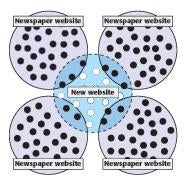
Archant‘s project to create geographically personalised websites for its readers has been delayed for nine months.
The geocoding project, which was first revealed in May, should have launched by now. Instead, coding work on the system was set to start this week, putting the launch date some time in mid-2008.
Archant development director Ian Davies told Press Gazette the delay was due to a last-minute switch to a new content-management system supplier.
Under the proposed new system, all 80 of Archant’s newspaper titles, and the group’s glossy magazines, will operate their websites from a single central database.
‘It’s about the robust development of an entirely new editorial system,’Davies said after a detailed presentation on the idea at Ifra’s conference.
Geographical information stored in each article will allow readers to personalise existing websites to focus on stories closest to themselves, and will allow the group to launch entirely new online titles to better serve readers at the outer edges of existing newspaper distribution areas.
‘With the increasing pressure on circulation and the huge importance of maintaining audience we can’t afford to ignore any parts of the community,’Davies said.
While many news organisations, including the BBC, Sky News, and the Grantham Journal, have experimented with plotting the location of their own news stories or user-submitted photographs on to online maps, few have used geographic coordinates to allow users to personalise sites.
The Norwegian site Budstikka.no may, however, give some indication of Archant’s plans. Each of its stories includes a small Google map showing the location of the story described.
Davies said the most important aspect of the proposed new sites will be the ability to personalise websites by displaying stories close to a location specified by the reader.
He said: ‘This means I can develop new brands entirely – much more local sites – and populate them from the central content store so that the cost of implementation is going to be low. It’s another way of taking our websites beyond the capabilities of the static page.”
‘User-centric localisation’online would particularly benefit readers who live in suburban locations or between two publications’ distribution areas, Davies said.
‘In print, those parts of the community are what you might regard as peripheral – imagine calling someone in your audience peripheral. With free distribution products, they can sometimes be completely ignored as being uneconomic to serve.
To make the system work, journalists will have to geocode their stories by adding postcodes or GPS coordinates to stories as they create them, Davies explained.
‘We know that capturing this location data is going to require a change of thinking from our reporting staff, but it’s just one of the many tasks that are part of the changing role of a local journalist. This will become routine as we move forward,’Davies said.
Archant has created a forum of 20 journalists to gain staff input on how the new sites will work.
Email pged@pressgazette.co.uk to point out mistakes, provide story tips or send in a letter for publication on our "Letters Page" blog

